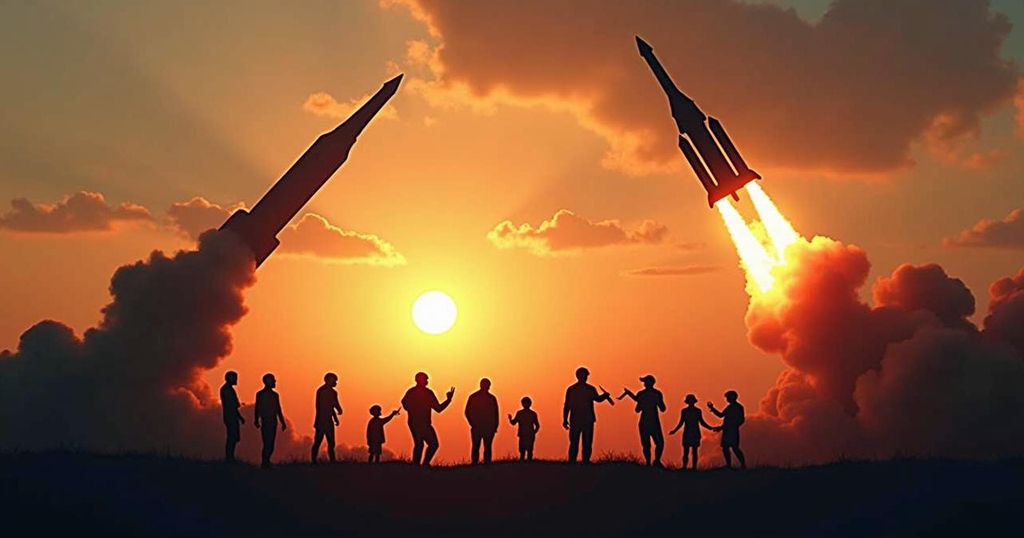Tensions between Iran and Israel have escalated dramatically over the past year, culminating in recent missile attacks by Iran on Israel in retaliation for Israeli military actions against Hamas and Hezbollah leaders. Key moments include the initiation of cross-border fire between Hezbollah and Israel, missile strikes targeting Iranian installations, and significant casualties resulting from Israeli airstrikes in Lebanon. Analysts emphasize the critical nature of diplomatic intervention to avert further conflict.
Over the past year, tensions in the Middle East have escalated significantly, culminating in Iran’s recent missile attacks on Israel, which were a direct response to a series of violent exchanges between Israel and its regional adversaries. On Tuesday, Israel faced a barrage of approximately 180 ballistic missiles launched by Iran, prompting a stern warning from Israeli Prime Minister Benjamin Netanyahu, who indicated that Iran had “made a big mistake.” The conflicts are primarily rooted in a series of retaliatory strikes linked to military actions taken by Israel against key figures in Hamas and Hezbollah, which prompted Iran’s military escalation. The conflict traces its beginnings to October 8, 2023, when lethal exchanges took place between Hezbollah and Israel following Hamas’s attacks that resulted in significant casualties in Israel, leading to Israel’s subsequent military campaign in Gaza. The return fire from Hezbollah in solidarity with the Palestinians marked a new front in this ongoing conflict, which has led to daily cross-border confrontations. Iran responded to specific Israeli aggressions, such as the destruction of its consulate in Damascus in April 2024, with retaliatory missile strikes aimed at Israel. These attacks were the first of their kind by Iran directly targeting Israeli territory. The assassination of prominent Hamas leaders, including Ismail Haniyeh in July 2024, further stirred tensions, as Iran vowed to enact severe reprisals, framing the clashes in broader regional terms. Significant loss of life and humanitarian crises have ensued from continuous military operations. For instance, from September 23 to 27, 2024, Israeli airstrikes killed over 700 individuals in Lebanon, leading to a major exodus and displacement of civilians. The Iranian leadership has characterized its military responses as necessary deterrents, reflecting on the international dynamics that influence the conflict. As analysts have noted, there has been a failure in diplomatic efforts that could have prevented escalation. Trita Parsi pointed out that the absence of a genuine ceasefire effort early in the conflict paved the way for the current situation, while Denijal Jegic criticized the role of the United States in shielding Israel from accountability for its military actions, exacerbating the ongoing violence and humanitarian fallout in the region.
This article examines the increasing tensions between Iran and Israel, following a prolonged period of military engagements that have escalated fears of a regional war. Key incidents, such as missile exchanges, ground offensives, and direct attacks on military and diplomatic assets, reveal a pattern of aggression that highlights the larger geopolitical dynamics influencing the Middle East. Understanding these factors is crucial to analyzing the trajectory and implications of the conflict, especially how international actions, notably those of the United States, play a pivotal role in shaping the responses of involved parties.
In conclusion, the recent missile attacks by Iran on Israel represent a significant escalation in the ongoing conflict that has seen severe repercussions for both sides, marked by extensive loss of life and humanitarian crises. The events analyzed highlight a complex array of retaliatory actions influenced by historical grievances and regional politics. The situation underscores the urgent need for diplomatic intervention to mitigate further violence and promote stability in the Middle East. The current trajectory suggests that unless meaningful efforts are made to address the underlying issues, the cycle of retaliation and suffering will persist, further aggravating an already fraught regional landscape.
Original Source: www.aljazeera.com







